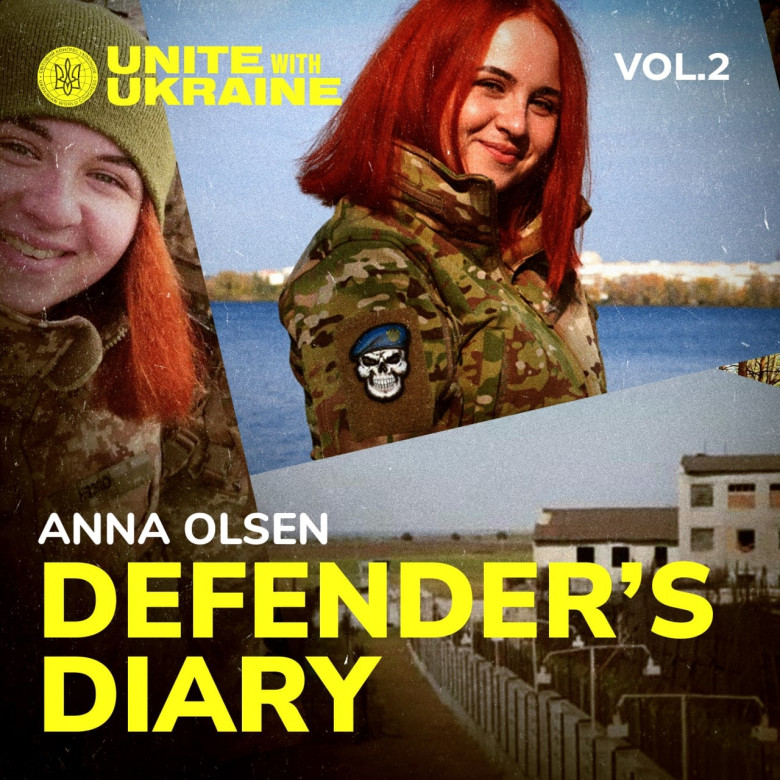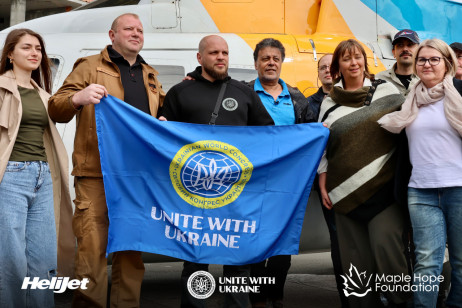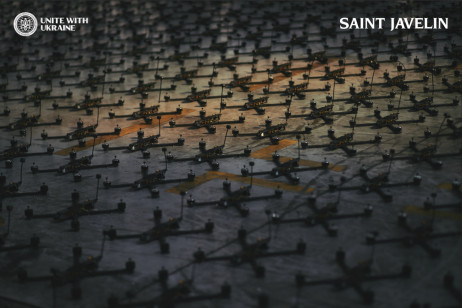
 BACK
BACK

Following is the second part of a story originally published in Novynarnia on November 25 about medic Anna Olsen, a brave defender of Mariupol who treated the wounded in a bunker at the Ilych steel plant. In part one, Anna described her decision to serve in the armed forces and how she ended up in the siege of Mariupol. After one unsuccessful breakout attempt, Anna’s unit decided to split up. Some would try another breakout and some, like Anna, decided to surrender to Donetsk People's Republic separatists.
How did it happen? Did you leave with a white flag or did you somehow inform the russians that you were leaving?
“I don't know the details. We had a senior officer who agreed on everything. They simply loaded us into a car again and took us to the border of the plant and then to the village of Myrne, where the DNR troops were stationed. They received us.
"They seriously said that we are Nazis, we eat children, we drink the blood of bullfinches"
"Russians said that we eat children and drink the blood of bullfinches."
“The first thing they did was take away our documents, valuables, mobile phones, etc. Only cigarettes were left for those who smoke, but not for everyone.
“And what nonsense they believed! They are thoroughly brainwashed. We were told that we eat children, that we are Nazis, fascists, drink the blood of bullfinches and so on. You look, in front of you is an adult who could be your parent. And he telling such a nonsense, you can’t get your mind around it!
“They also said that this war is is our fault because we did not give them the freedom to join the Russian Federation, because we are the ones who bomb peaceful cities like Mariupol.
“Fortunately, we stayed at this point for only about six hours. They even gave us tea! It was an interesting moment. We looked at that tea so skeptically, but their officer said, ‘Don't be afraid, we are not you. We will not poison anyone.’
“Obviously, no one drank that tea.
“Then we were brought to Olenivka [a POW detention center in the village of the same name in occupied territory of Donetsk Oblast]. And our boys were received very harshly.
“BRUTALITY HAPPENED ESPECIALLY TO OUR OFFICERS, THEY WERE LIKE A RED RAG TO A BULL. THE HIGHER YOUR RANK, THE MORE THEY CAME FOR YOU”
“Girls were not touched then. We were simply taken out of the bus and lined up. The guard on duty approached each one, wrote down the names, brigade, unit, dates and factory of capture.
“Detention in Olenivka was, of course, terrible. There were 39 of us in a cell designed for a maximum of 6 people. We slept where possible – on the bench, under the bench, on the table, under the table. Two or three people per square meter. One would get up to stretch her legs and the other would lie down - that's how we took turns.
“The food was so-so. For breakfast, a third of a round white bread and tea...That's all. No problems with bread in Olenivka. And it was our bread, native bread, because it tasted fresh and we were happy about it. There was lunch, which was closer to dinner. They gave us some kind of porridge, but it was very little - less than my fist. In general, the portions were completely ridiculous, and the women did not get enough. And what can we say about the boys.
“Sometimes we were taken to work - to peel potatoes or onions, help in the kitchen, deliver food to our boys. It was at least some kind of communication, because we had no other opportunity to see them.
“We stayed in Olenivka for a short time - maybe a week.
“THEN WE WERE TAKEN TO RUSSIA AND WE REALIZED THAT THE DPR IT WAS SUCH A LIGHT VERSION OF IMPRISONMENT…”
"We were lucky. Stress caused a hormonal failure, and menstruation stopped"
Anna Olsen with the correspondent of "Novynarnia" during an interview. Photo: Novynarnia
“As it turned out, we were brought to Taganrog, in Rostov, Russian Federation. And as soon as we got off the bus, we realized that we were very firmly trapped. Now the game of survival and testing of morale and mental spirit begins.
“As soon as we set foot on the ground, we were tied in a posture called the crab. So that you understand, you have to press your knees to your forehead.. Your hands are always behind your back, your head is completely bent - you can't see where you're running (and they're chasing you). You don't have time. They take you by the skin of the neck, like a kitten, and drag you wherever they want.
“There we were held in a pre-trial detention center, where we were moved to different buildings and floors. They treated us in a way that you wouldn't wish on an enemy. These people have absolutely no idea what the Geneva Convention is, how prisoners of war should be treated. They did not give us any opportunity to contact our relatives and to inform them that we are alive.
“As for clothes, we were given the clothes that their convicts wear – trousers, shirt, coat and size 43 shoes. And you get to run in them with your size 38 feet.
“The beds were cast iron, inflexible. As for food, we don't even feed dogs like that. The portions were tiny, but that didn't matter because this ‘food’ was cold and absolutely spoiled. It is simply impossible to eat like this.
“The only thing that saved us was that they gave us two pieces of black and white bread once a day. That's how we lived on bread and water for all 35 days that I was there.
“We ‘bathed’ once a week in cold water for 3 minutes, so there was no question of any personal hygiene. If someone started having critical days, they gave out some pads, but they didn't absorb anything.
“IT'S TRUE, IN THIS PLAN, MANY GIRLS WERE LUCKY, BECAUSE THE STRESS CAUSED A HORMONAL FAILURE AND MENSTRUATION STOPPED”
“But not everyone was so lucky.
"They poured boiling water on my tattoo. They wanted to remove it along with the skin"
Anna Olsen. Photo: Newsroom
Were you interrogated?
“Constantly. They directed so many insults at the girls – that women should stay home, get pregnant and serve their husbands, not go to the army, everything along these lines. Of course, all this was accompanied by a lot of profanity.
“Interrogations were conducted mainly by russian officers, special forces and operatives, and they all behaved like animals. They used psychological and physical torture. In this sense, they did not differentiate by gender.They said any woman not sitting at home as a man's servant, but wearing a uniform, deserved the problems they brought us. And they hit us wherever they wanted... I won't elaborate.
“At the same time, the russians constantly tried to make us into snipers or intelligence agents, as they imagined. They wouldn’t give up trying to pin these designations on each of us. For some reason, they designated me as a sniper. I asked why and they answered,
“BECAUSE YOU HAVE TWO TATTOOS ON YOUR HAND AND YOU ARE RED-HEADED!”
Ukrainian tattoos, as we know, are hated by rashists.
“Oh, yes, for my tattoos, I was constantly grabbed hard. This tattoo (shows hand) was poured with boiling water - they tried to remove it. They threatened to cut off my hand or cut my skin with a knife, called me a Nazi, a fascist.
“It is true for them that we are all Nazis and fascists who ‘renounced our history.’ Meanwhile, they completely distort the history of the Second World War. According to their propaganda, we worked with the Nazis, killed Poles and Jews - and almost killed the whole world. And they are so awesome, they came and saved the whole world.
“They are also convinced that we disrespect the veterans of the Second World War, that we have torch processions, that we shout ‘Bandera!” and go around with pitchforks beating Muscovites. And that russian-speakers are kicked in the street. - that's why they came to ‘asvabazhdat’. [Phonetic pronunciation of russian for liberate]
“I grew up in a Russian-speaking city. I am fluent in three languages: Ukrainian, Russian and English. I am still learning Turkish. I’ve been speaking surzhyk all my life. And many of my friends speak Russian. No one has ever had any problems!”
Is that how you answered them?
“Well, at first I tried to explain that I am from southern Ukraine, that many of us speak Russian. I even had Russian language and literature at school! I told them that I was reading - well, at that time I was reading - books by Russian poets.
“But for them it was something from the realm of fiction, because it broke the established picture. Their brains are so brainwashed that it is easier to talk to the wall than to prove something to them.
“And the boys had it much worse. My cell was just opposite the interrogation room where they were taken. And we could hear everything that happened there from 8 in the morning until late in the evening. It was oppressive to morale.”
"You wake up, eat and even go to the toilet to the anthem of the Russian Federation"
Did you believe that you would be released, exchanged? That Ukraine has not forgotten about you?
“I'll be honest. Sometimes I thought that it would never end. This constant brainwashing was really getting to me. They continuously said that Ukraine no longer exists, that Europe has given up on us, that there are already russian banks everywhere, russian currency. That no one will exchange prisoners for us, so we will sit there until some russian takes pity and decides to marry us.
“The anthem of the Russian Federation played constantly. Imagine: you wake up, eat and even go to the toilet to the anthem of the Russian Federation, which you are also forced to learn and sing. It happened at least 17 times a day!
“At the same time, we were forbidden to speak Ukrainian at. If they heard it, the first time were verbal threats, and the second or third time - physical punishment. But we still spoke in whispers. Basically, we had to support each other.
“For example, when we had to sing their national anthem, that's how we did it:
“ONE OR TWO GIRLS STOOD NEAR THEM AND LOUDLY SANG THE RUSSIAN ANTHEM, WHILE THE REST OF US SANG THE UKRAINIAN ANTHEM.
“It helped a lot not to despair and to remember that we are Ukrainians, and therefore, we will endure it all. How much our people have been oppressed for their language, for their culture. Yet, we preserved them!
“I constantly said, girls, we are remembered, we must endure everything. It cannot be that our country does not want to bring us home. I can bet that it is the russian side that does not report us and submit for exchange.
“As it turned out, I was right. The russians reported us as prisoners of war only in the summer, after we were transported to Belgorod. And then the russian side canceled the planned exchange several times. They do that very often.”
"Russian women convicted of serious crimes were very afraid of us"
Where were you taken in Belgorod?
“After 35 days in Taganrog, we were taken somewhere again. We were sure that it would be even worse. But it turned out to be a little easier. It was a women's penal colony in the city of Valuyka, where Russian women convicted of serious crimes are held. But we crossed paths with them only at work.
“The work is a type of garment factory where girls work as seamstresses. We worked there for two and a half months and even, so to speak, received a salary. But it all went to hygiene needs, because we were not given any shampoo or other hygiene products.”
Prisoners in the penal colony in Valuyka, Russia, at work. Illustrative photo from open sources
How did the Russian criminals treat you?
“They didn't talk to us very much, but when they did talk, they mostly repeated all the propaganda they heard on TV – that there is no more grain, bread, or water in Ukraine, that our pensioners are dying of hunger and everyone in the army is sleeping or taking narcotics The oldest woman among them assured us that one loaf of bread costs 500 or 600 hryvnias.
“But mostly they stayed away. Because they were very afraid of us! And not only them, but also the female guards. They shouted at us, tried to humiliate us, but we reacted with indifference.
“We, 24 Ukrainian girls, were driven to work by two special forces and two guards. They even accompanied us to the toilet. While you do your business, one stands at the entrancean d the other stands next to the stall! We were so dangerous.
“Once, during work, we all went out together for a scheduled smoke break in the smoking room. A convict was smoking in a flower bed nearby.
“AS SOON AS SHE SAW US, SHE FELL ON HER BELLY AND STARTED TO CRAWL. WE WERE A LITTLE SHOCKED WATCHING THIS.
“The guard asked her what happened and she said: ‘I'm so afraid of them! I don't want them to see me. They will find me later and kill me!’ (laughs)”
And in the rooms, it turns out, you lived with your own, separately from others?
“Yes, 19-20 girls in one section (that's what the rooms are called there).
“At first, there were 80 girls taken from Olenivka to Taganrog and about 60 were taken to Valuyka. We could see our friends from other sections during walks or in the dining room, when two sections were taken at the same time.
“To be honest, we thought that those girls who were not in Valuyka had already been exchanged. We really hoped that they were already at home and could tell our relatives who had been with them.
“Right away we made an agreement that the first ones to return to Ukraine would immediately report the names of other captives or write to their relatives. Because we weren't even sure if our relatives knew that we were alive at all.
“So, when we were all brought together during the exchange, it was very strange to see familiar faces. We were scattered all over Russia. Someone changed their place of detention three times, another five, another even more.”
The world needs to do more to step up and defend Ukraine's democratic right to determine its own future.
DONATE NOW
Ukrainian World Congress, Maple Hope Foundation, and Helijet Deliver Lifesaving Medical Helicopter to Ukraine
on Apr 16, 2025

Ukrainian World Congress Delivers 750 FPV Drones to Ukrainian Defense Forces
on Apr 11, 2025
Spread the word on social media. The world can only unite when people are rallied to the urgency of Ukraine's situation.
SHARE SITE